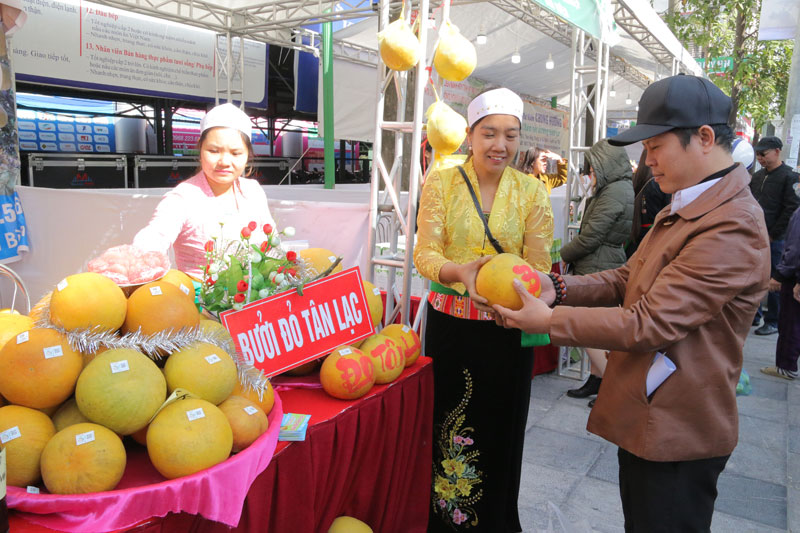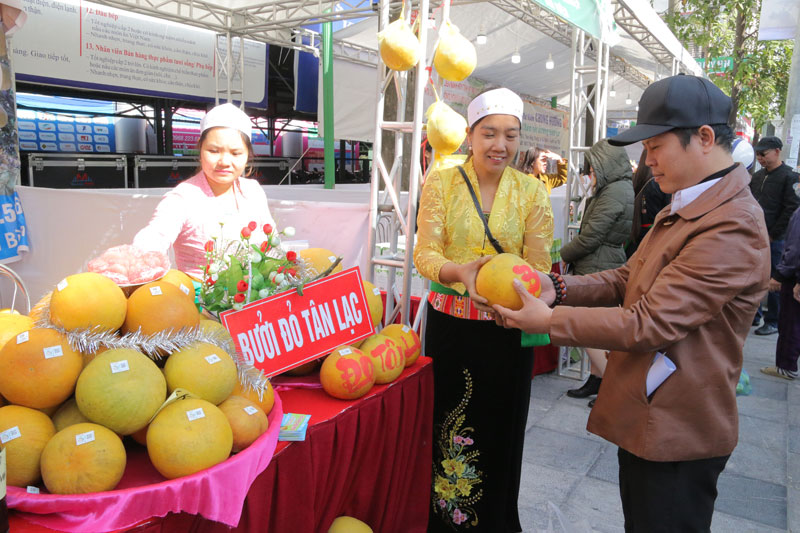
(HBO) – A week introducing Hoa Binh’s food and agricultural products was held at five Co.opmart supermarkets in Hanoi in mid-December 2019, attracting over 8,000 visitors. The products were offered by local cooperatives and businesses that signed cooperation agreements to supply goods for Saigon Co.op.

Hanoi customers buy Tan Lac red-flesh pomelos
at Saigon Co.op during the week.
So far, the province has had over 7,000 hectares
of citrus fruits, which are able to produce over 15,000 tonnes of fruits per
year, along with other special farm produce. Through trade promotion
activities, the province hopes to have more channels to connect supply-demand
chains and promote its high-quality safe farm produce. Earlier, two local fruit
specialties namely Cao Phong oranges and Tan Lac red-flesh pomelos had been
supplied for the retail system of Saigon Co.op
Tran Quoc Viet, managing director at Saigon
Co.op in the north, said this creates good opportunities for the company to
expand its investment and involvement in production value chains in the
province. Cooperatives are still strategic partners to realise this target, he
said, adding that the involved parties should strengthen coordination to
increase the presence of local farm produce in Co-op supermarkets.
He suggested cooperatives improving the
packaging, storage and delivery of products to ensure its best taste.
Tran Van Thanh, chairman of the provincial
cooperatives union, said through the successful week, the union hopes the
provincial People’s Committee will pay more attention and create better
conditions for the union to promote local farm produce in big cities nationwide
as well as join trade fairs and connection conferences at home and abroad./.
According to data from the Hoa Binh Provincial Party Committee, the industrial production index for the first six months of 2025 is estimated to have increased by 20% compared to the same period last year. This marks the highest year-on-year growth rate for this period since 2020.
In the first six months of 2025, Hoa Binh province’s export turnover was estimated at 1.145 billion USD, marking an 18.11% increase compared to the same period in 2024. Import turnover was estimated at $ 804 million, a 17.15% increase, which helped the province maintain a positive trade balance.
The lives of the ethnic minority farmers in Tan Lac district have gradually improved thanks to the new directions in agricultural production. This is a testament to the collective strength fostered through the professional associations and groups implemented by various levels of the district’s Farmers’ Union.
With the motto the "product quality comes first,” after nearly one year of establishment and operation, Muong village’s Clean Food Agricultural and Commercial Cooperative, located in Cau Hamlet, Hung Son Commune (Kim Boi district), has launched reputable, high-quality agricultural products to the market that are well-received by consumers. The products such as Muong village’s pork sausage, salt-cured chicken, and salt-cured pork hocks have gradually carved out a place in the market and they are on the path to obtaining the OCOP certification.
In the past, the phrase "bumper harvest, rock-bottom prices" was a familiar refrain for Vietnamese farmers engaged in fragmented, small-scale agriculture. But today, a new spirit is emerging across rural areas of Hoa Binh province - one of collaboration, organisation, and collective economic models that provide a stable foundation for production.
Maintaining growing area codes and packing facility codes in accordance with regulations is a mandatory requirement for agricultural products to be eligible for export. Recently, the Department of Agriculture and Environment of Hoa Binh province has intensified technical supervision of designated farming areas and packing facilities to safeguard the "green passport" that enables its products to access international markets.



